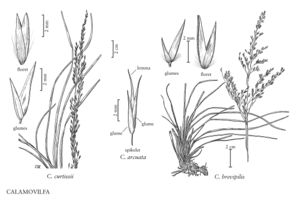Difference between revisions of "Calamovilfa brevipilis"
FNA>Volume Importer |
imported>Volume Importer |
||
| (8 intermediate revisions by 2 users not shown) | |||
| Line 4: | Line 4: | ||
|publications= | |publications= | ||
|common_names=Pine-barren sandreed | |common_names=Pine-barren sandreed | ||
| + | |special_status={{Treatment/ID/Special_status | ||
| + | |code=E | ||
| + | |label=Endemic | ||
| + | }} | ||
|basionyms= | |basionyms= | ||
|synonyms={{Treatment/ID/Synonym | |synonyms={{Treatment/ID/Synonym | ||
|name=Calamagrostis brevipilis | |name=Calamagrostis brevipilis | ||
| − | |authority= | + | |authority= |
| + | |rank=species | ||
}} | }} | ||
|hierarchy=Poaceae;Poaceae subfam. Chloridoideae;Poaceae tribe Cynodonteae;Calamovilfa;Calamovilfa brevipilis | |hierarchy=Poaceae;Poaceae subfam. Chloridoideae;Poaceae tribe Cynodonteae;Calamovilfa;Calamovilfa brevipilis | ||
| Line 20: | Line 25: | ||
-->{{Treatment/Body | -->{{Treatment/Body | ||
|distribution=N.C.;S.C.;N.J.;Va. | |distribution=N.C.;S.C.;N.J.;Va. | ||
| − | |discussion=<p>Calamovilfa brevipilis grows in moist to dry pine barrens, savannahs, bogs, swamp edges, and pocosins. It is a common grass on the New Jersey pine barrens and locally common across the coastal plain of North Carolina, but rare at present in Virginia and South Carolina. The length of the ligule hairs tends to increase from 0.3 mm or less in the north to 0.5 mm at the southern end of its range.</p> | + | |discussion=<p><i>Calamovilfa brevipilis</i> grows in moist to dry pine barrens, savannahs, bogs, swamp edges, and pocosins. It is a common grass on the New Jersey pine barrens and locally common across the coastal plain of North Carolina, but rare at present in Virginia and South Carolina. The length of the ligule hairs tends to increase from 0.3 mm or less in the north to 0.5 mm at the southern end of its range.</p> |
|tables= | |tables= | ||
|references= | |references= | ||
| Line 29: | Line 34: | ||
-->{{#Taxon: | -->{{#Taxon: | ||
name=Calamovilfa brevipilis | name=Calamovilfa brevipilis | ||
| − | |||
|authority=(Torr.) Scribn. | |authority=(Torr.) Scribn. | ||
|rank=species | |rank=species | ||
| Line 36: | Line 40: | ||
|basionyms= | |basionyms= | ||
|family=Poaceae | |family=Poaceae | ||
| + | |illustrator=Linda A. Vorobik;Cindy Roché | ||
| + | |illustration copyright=Utah State University | ||
|distribution=N.C.;S.C.;N.J.;Va. | |distribution=N.C.;S.C.;N.J.;Va. | ||
|reference=None | |reference=None | ||
|publication title= | |publication title= | ||
|publication year= | |publication year= | ||
| − | |special status= | + | |special status=Endemic |
| − | |source xml=https:// | + | |source xml=https://bitbucket.org/aafc-mbb/fna-data-curation/src/200273ad09963decb8fc72550212de541d86569d/coarse_grained_fna_xml/V25/V25_708.xml |
|subfamily=Poaceae subfam. Chloridoideae | |subfamily=Poaceae subfam. Chloridoideae | ||
|tribe=Poaceae tribe Cynodonteae | |tribe=Poaceae tribe Cynodonteae | ||
Latest revision as of 17:58, 11 May 2021
Rhizomes short, covered with the persisent bases of the foliage leaves. Culms to 1.5 m. Sheaths to 30 cm; ligules to 0.5 mm; blades to 50 cm long, 2-5 mm wide. Panicles 8-40 cm long, 4-20 cm wide, open; branches to 17 cm long, ascending to spreading. Spikelets 4-5.8 mm. Glumes straight, acute; lower glumes 1.7-4.1 mm; upper glumes 3.3-5 mm; callus hairs 1/4 - 1/2 as long as the lemmas; lemmas 4-5.4 mm, straight, slightly to markedly pubescent, acuminate; paleas 3.8-5.3 mm, slightly to markedly pubescent; anthers 2.4-3.2 mm. 2n = unknown.
Distribution
N.C., S.C., N.J., Va.
Discussion
Calamovilfa brevipilis grows in moist to dry pine barrens, savannahs, bogs, swamp edges, and pocosins. It is a common grass on the New Jersey pine barrens and locally common across the coastal plain of North Carolina, but rare at present in Virginia and South Carolina. The length of the ligule hairs tends to increase from 0.3 mm or less in the north to 0.5 mm at the southern end of its range.
Selected References
None.
